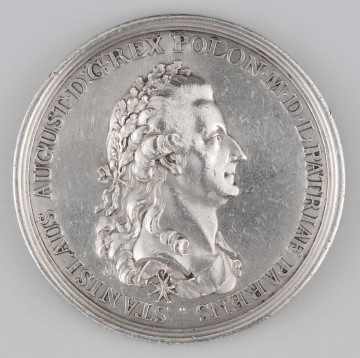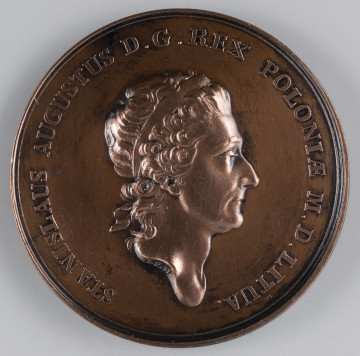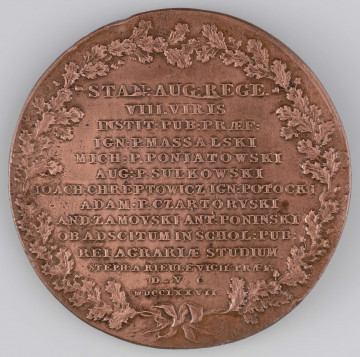
Stanisław August Poniatowski - adoption of the Constitution of 3 May
1791
National Museum in Lublin
Part of the collection: Polish medallic art.
The reforms undertaken in Poland in the first years of the reign of Stanisław August Poniatowski (1764-1795) aroused opposition from neighbouring states, particularly Russia under Catherine II (1762-1796), which sought to consolidate its protectorate over its western neighbour. As the result of the skilful and ruthless policy of the Russian Ambassador Nikolai Repnin, in 1768, the Sejm of the Republic enacted a catalogue of the fundamental laws of the state system, the invariability of which was guaranteed by Russia. Apart from free election and liberum veto, the cardinal rights included religious matters. Catholicism was guaranteed the status of the ruling religion, while Protestants and Dissenters were granted complete freedom of worship, the right to build and rebuild temples and schools, and the equal and unrestricted right to hold public office. Stanislaus August Poniatowski, who was submitting to the Enlightenment ideas, was also a supporter of restoring rights to dissidents. This was at the same time a difficult and socially sensitive issue, which Russia used to provoke a conflict between the conservative nobility and the reform camp.
The restoration of the rights of dissidents in Poland was a momentous event in Europe. It is commemorated by a medal created in Nuremberg, in the workshop of the renowned medallist Johann Leonard Oexlein (1715-1787). It is not known on whose initiative this work was created. Its obverse depicts the bust of King Stanislaus August Poniatowski in armour with an ermine cloak superimposed over it and a circumferential inscription: Stanislaw August, by God's grace king of Poland, Grand Duke of Lithuania. The representation of the ruler may have been modelled on an anonymous portrait from around 1765 or a copperplate engraving by Antoine de Marcenay de Ghuy, created after that date in Paris. On the reverse side there is a building stylised as the ancient Temple of Concord – described on the portal with the word: ‘CONCORDIA’. In front of its entrance stand two figures kissing, symbolising Justice and Peace. The Latin inscription: Rights of dissidents restored 1768, below indicates the motive for the medal's creation.
The copy of the National Museum in Lublin is a gift from the bequest of Julia Sekutowicz, wife of the President of the Court of Appeal in Lublin Bolesław Sekutowicz (1881-1939), given to the institution after her death, on 28 March 1949.
Tomasz Markiewicz
Author / creator
Dimensions
cały obiekt: width: 38 mm
Object type
medal
Technique
stamp minting
Material
silver
Creation time / dating
Creation / finding place
Owner
The National Museum in Lublin
Identification number
Location / status

1791
National Museum in Lublin

1790
National Museum in Lublin

1777
National Museum in Lublin
DISCOVER this TOPIC
Castle Museum in Łańcut
DISCOVER this PATH
Educational path